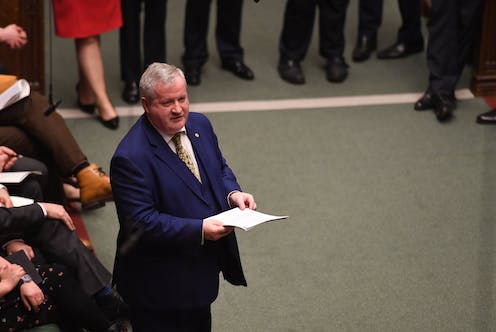Ian Blackford, the Scottish National Party’s leader in Westminster, has announced that he is resigning from the post. Having survived two attempts by his own MPs to remove him already this year, there is speculation that he has jumped before being forced out by his colleagues.
Blackford has been a consistent presence on the green benches, serving alongside four prime ministers and two leaders of the opposition. And there is no question that he has made an impact. Love him or hate him, Blackford has done some incredibly interesting things in parliament by making the most of the chamber’s complex rules to suit his agenda. Here are five of the most memorable moments:
1. Kicked out of the Commons chamber for calling Boris Johnson a liar
During a speech in the Commons on the publication of Sue Gray’s partygate report in January 2022, Blackford told MPs how Johnson had “dishonoured” the office of prime minister and “wilfully misled parliament”. This put him in hot water with the House of Commons speaker who repeatedly asked him to withdraw.
When he refused to do so, insisting that he would “speak truth to power”, Hoyle asked him to leave the chamber, only to find out that Blackford had already walked out by himself. He pushed things so far that he clearly knew he was going to be made to leave, but walking out on his own terms meant that he avoided being formally suspended from participating in Commons business.
2. Taking the initiative to hold Boris Johnson to account over partygate
In November of 2021 Blackford used one of his party’s rare opportunities for an opposition day debate to censure Boris Johnson for violating the sixth principle of public life (honesty).
This was a clever move, enabling him and his party to have a more frank debate on the conduct of the former prime minister than they would ordinarily be able to do, all while staying within the confines of parliamentary rules. Telling MPs that the charge sheet against Johnson was “damning”, Blackford made it clear that he did not want the prime minister to “think he has gotten away with the mess he has made”.
3. Leading an SNP walkout from the Commons in a Brexit protest
As MPs debated Brexit in June 2018, the SNP was frustrated that the changes being made to to the devolution settlement as the UK left the EU were not being given adequate debating time. Cheered on by his colleagues, Blackford interrupted prime minister’s question time (PMQs), requesting that the House vote to sit in private and discuss the matter.
When his call was blocked by the Speaker, Blackford refused to sit down. Instead he led his party on a walkout of the Commons chamber. He later promised to “use every measure” at his party’s disposal to continue to protest the implications of Brexit for Scotland.
4. Pushing for no-confidence motions to challenge prime ministers
When former prime minister Theresa May postponed a vote on the Brexit deal she had negotiated with the EU back in December 2018, MPs called for a no-confidence motion in the prime minister. When Jeremy Corbyn, then Labour leader, failed to call it, Blackford described him as the “midwife of Brexit” and accused him of letting the government off the hook.
Blackford joined forces with other opposition party leaders to table their own version of a no-confidence motion. Although this did not have the same clout as one from the official opposition, it pushed Corbyn to table his own motion after the Christmas recess, one which the government only narrowly won.
When the Liz Truss’s premiership fell apart in October this year, Blackford wrote to Labour’s current leader, Keir Starmer, to urge him to consider another no-confidence motion in the government, saying that he couldn’t “stand idly by” while yet another prime minister was placed in Number 10 without a public vote.
5. Challenging Sunak’s mandate in the debate around Scottish independence
When the supreme court ruled last month that Scotland could not hold a second independence referendum, Blackford was granted an urgent question in the Commons. He used it to call on the prime minister to make a statement on the rights of the Scottish people and how the court’s decision relates to democratic principles.
Read more:
UK supreme court rules Scotland cannot call a second independence referendum – the decision explained
Blackford highlighted the contrast between the decision not to grant Scotland a vote with the decision the Conservative party had made to install Sunak as prime minister without holding an election. Remarking that the SNP has won “eight elections in a row” in Scotland, Blackford suggested the party had more of a mandate on the matter of independence than Sunak did as prime minister.
The fact that several other SNP MPs had also managed to get themselves a slot on the commons order paper for PMQs that day meant that the session was dominated by the party’s concerns for the future of UK democracy.
Although critics have accused Blackford of opting for the wrong strategies and resorting too often to “parliamentary parlour games” during his time as leader, there can be no doubt that he has helped the party garner increased air time during his tenure.
His adversarial oratorial style and procedural skill in straddling what at times is a very fine line between acting within and beyond Commons rules, has brought him and the SNP visibility within the chamber and outside it. Whoever the new SNP leader is at Westminster, they will have large parliamentary shoes to fill.
![]()
Louise Thompson does not work for, consult, own shares in or receive funding from any company or organisation that would benefit from this article, and has disclosed no relevant affiliations beyond their academic appointment.










